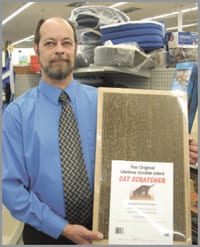Getting Down to Business Program Helps Those with Disabilities Become Entrepreneurs
He calls it the “Lifetime Double-sided Cat Scratcher,” a name that tells you pretty much all you need to know about this product.
Indeed, this is a cat-scratch box (retailing for $29.95) that is guaranteed for the life of the item — something that could not have been imagined with previous products, said Ken Rivet, who brought it to the market and now has it placed in several stores across this region and as east as Natick and an Expressly Pets location there. And it’s worthy of such a guarantee, he said, because it is made of wood, is double-sided, and the cardboard is packed in so tightly that it becomes far more durable and holds up better to constant cat scratching than anything previously on the shelves at pet-supply stores.
Rivet came up with the idea in keeping with the old saying about invention — it was out of necessity. “We had five cats, and I used to buy the stupid things just about every month because our cats tore them apart.” So he went to the workshop in his basement, where many ideas have come to fruition, and figured out a solution.
And in so doing, his concept — and drive to bring it to the marketplace — eventually become one of the many intriguing success stories generated by the Business Development Center, a component of New England Business Associates, also known as NEBA Works, a nearly three-decade-old regional nonprofit recognized nationally for its work in supported employment.
In a nutshell, the BDC, as it’s called, helps individuals with physical and intellectual disabilities become entrepreneurs, said Colleen Moynihan, director of the center since 2008. She told HCN that the center’s staff has worked with a number of clients to create a host of businesses, ranging from Rivet’s venture, called Creative Ideas, to a landscaping outfit launched by Joe Schmidt in West Springfield; from a few restaurants to a company called the Knowledge Is Power Group, a consultancy focused on development of education programs for special-needs children.
Working in concert with SCORE, the Service Corps of Retired Executives, the BDC helps clients with development of a business plan, said Moynihan, and then assists them through the challenging process of starting and growing a business. The ultimate goal is to enable individuals with disabilities to eventually become self-sustaining and thus take themselves off Social Security Administration disability benefits.
It has done so with many clients, including Schmidt, who has long suffered from panic disorder but, with the help of the BDC, has steadily grown his landscaping venture over the past several years, and now has several employees. He told HCN that he’s proud to be off federal assistance, but admits that these past few months have been extremely challenging cash-flow wise because snowplowing work, a key component of his business, has been virtually nonexistent.
“It’s been a very difficult start to this year, obviously,” he said, adding quickly that, with an early start on spring, he’s looking to bounce back and add to a client list that already includes several auto dealerships and condominium complexes among many other commercial and residential clients.
Rivet, a former welder who suffered a severe neck injury on the job and later tried to work unsuccessfully with that disability — suffering through depression and alcohol abuse while doing so — is typical of many who eventually come to the BDC seeking assistance.
“I was suffering from depression, then I started drinking, and I couldn’t sleep at night because I was worrying about the bills,” he recalled. “I realized I was going nowhere. But I was always good at inventing things, and I never stopped thinking about getting my own business going.”
For this issue, HCN goes behind the scenes at the BDC to learn how the center helped Rivet make that dream finally become reality by putting NEBA’s slogan — “aligning ability with opportunity” — to work as it fosters entrepreneurship and enables those with disabilities to achieve self-sufficiency and financial independence.
Work in Progress
Moynihan said that many of those who come to the door of the BDC, located at the Scibelli Enterprise Center at Springfield Technical Community College, are initially looking for someone, or something, else.
“Often they’re trying to find SCORE, the SBA [Small Business Administration], or the [Mass.] Small Business Development Center,” she explained. In many cases, individuals will start at those agencies (all also located in the EDC), but wind up back at her office.
That’s because those organizations and others will refer them there to gain the valuable assistance they will need to take a business concept off the drawing board and make it reality.
That help comes in the form of a 10-class entrepreneur-development program that takes individuals from a draft of their mission statement to identification of profit and revenue goals; from tying their product or service to a target market and competition to learning effective marketing techniques.
Along the way, there are lessons in a host of matters involved with getting a venture off the ground and then to the next level, including balance sheets, legal matters, taxes, use of the Internet for marketing and sales, cash flow, and much more. And while doing all this, the BDC also works to help clients build self-esteem and gain the confidence (something many individuals are lacking) necessary to launch a successful business, said Eric Fiedler, outreach and development coordinator for the center.
This unique mission came about, said Moynihan, when NEBA administrators came to the realization several years ago that there was a gap in the agency’s roster of services to clients. Elaborating, she said that the existing programs were designed to assist people with disabilities gain meaningful employment. Largely missing from this equation was the element of self-employment, she went on, adding that this route is often an attractive option for many who struggle to work in traditional settings.
“Supported self employment is an option that matches a person’s dreams and talents to an economic activity that promotes self-sufficiency and final independence,” she said while explaining the genesis of the program and its importance to the broad mission of NEBA Works. “Successful business ownership can create financial options that wage employment may not.”
And while self-employment is the primary objective for many who become involved in the program, said Fiedler, some can attain better, higher-paying jobs in a variety of settings because of the skills and confidence they’ve acquired through involvement with the BDC.
Overall, success is measured in a number of ways at the BDC, said Moynihan, noting that one barometer involves achieving sustainable business revenue. Meanwhile, others might include bringing on additional employees or becoming involved in the community through appointment to a nonprofit’s board of directors.
But perhaps the biggest milestone is that ability to move off Social Security disability benefits, she continued, noting that, in addition to the bottom-line benefits to the taxpayers from removing individuals from assistance programs, there is an all-important sense of accomplishment and financial independence for the individuals involved.
In Good Company
Moynihan and Fiedler said there have been a number of such success stories written by BDC clients, with many more, including Rivet’s, still in the early stages.
Indeed, last fall, the center announced the launch of seven new ventures, all with SCORE-reviewed business plans, and now fully operating. They include Rivet’s Creative Ideas; Mr. Budgeter, a personal-budget consultancy; American Pride Painting, which specializes in the restoration paiting of vintage homes; Mark’s Small Engine Repair; and Divine Divas, an image consultancy owned by Patricia “Coffy” Smith that works with individuals and groups seeking to improve their self-image.
These new ventures join more than a dozen others started over the past few years. These include Felix’s Restaurant in Springfield, which now has a half-dozen employees; Schmidt’s landscaping business; Lit’l Bear’s Den in Greenfield; a store selling Native American crafts; and the Knowledge Is Power Group, created by Lavek Nisenkier.
Nisenkier told HCN that his venture puts on workshops for teachers and parents on current issues in education, such as anti-bullying efforts, working with behaviorally challenged students, and teaching social skills.
He said his company’s services differ from those that are provided by others in that there is follow-up after those workshops are completed to help ensure continued progress with the matter at hand.
“I revisit the teacher and the student to see if the plan is working,” he explained, “and whether there needs to be any adjustments to it.”
As for Rivet and his cat-scratching posts, he now has 17 clients, or outlets, and his product is in some 35 locations across the state. He’s in discussions with the Big Y chain about putting the item on its shelves.
As he talked with HCN about his venture in the cat-supplies aisle at Dave’s Soda and Pet Food City location in Agawam, Rivet said he has long harbored ambitions about turning his product into a business, but needed some help — with everything from the business plan to understanding the numbers — to get there.
“I tried to start businesses at various times,” he explained. “People always liked my ideas, but then they would ask questions like, ’what are your three-year sales projections?’ They would ask all these questions, and I just wouldn’t have the answers.”
With the help of Moynihan, Fiedler, and others, he would eventually come up with some answers for a concept he called Creative Ideas, which would attempt to bring some of his many inventions — a twist-tie dispenser, a spice rack, a photo-storage box, and a unique set of coasters are among some of the others — to the marketplace. The scratching post has been the focal point of his efforts for the past several years, he went on, noting that facilities like Dave’s would buy up the items as quickly as he could make them, meaning that he would eventually have to both ramp up and outsource production.
“I was just unable to keep up with demand, so I tried to start my own factory,” he said, adding that he lacked the solid credit needed to get bank financing.
However, with assistance from the BDC and SCORE, he recently signed an agreement with Roca, the nonprofit agency that assists high-risk youths in Chelsea, East Boston, Revere, and Springfield, to have participants in its program produce the cat-scratch boxes at one of its job centers. Inmates at the Hampden County Correctional facility in Ludlow will be making them as well. The products will be shrink-wrapped at the Work Opportunity Center in Agawam.
Initial plans call for the two facilities to produce 300 of the scratch boxes a week, said Rivet, adding that he believes he now has the locations to sell that many. And eventually, he wants to bring more of his many inventions to the marketplace. “Everything I make is something unique that you can’t find anywhere else.”
As for that other important measure of success, moving off Social Security benefits — Rivet expects to be there by the end of this year.
The Bottom Line
Doing some quick math, Rivet noted that, if he were to produce and sell 5,000 of his cat-scratching posts per month, in six years he would have perhaps 1{06cf2b9696b159f874511d23dbc893eb1ac83014175ed30550cfff22781411e5} of all cat owners as customers.
He doesn’t get caught up in such numbers, though, choosing to focus instead on reasonable, controlled growth, while managing his disability and achieving financial independence. He’s come a long way with each of these goals, but knows that each day presents new challenges and opportunities.
Business-wise, he’s just scratched the surface of his potential — literally and figuratively — and in so doing has become one of many working models of how the BDC is helping those with disabilities find success though business ownership.


